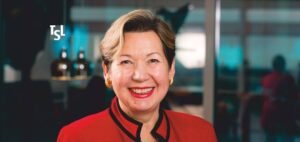She did not enter the field from behind a desk, but at the very heart of public health research at Tenon Hospital in Paris, where data intersects with real lives and policies shape destinies. From the outset, she understood that true change cannot be theorized: it must be lived, measured, and improved.
This understanding shaped Rabiatou Sangaré: a strategist, a female leader who has dedicated her career to designing and implementing strategies to improve the health and well-being of vulnerable communities in Africa—empowering youth and women to take their place and play their role in society. Through RAES NGO, where she serves as Program Director, Rabiatou helps equip local actors with tools and skills to co-create, lead, question, and transform their future.
In sub-Saharan Africa, the challenges are significant: maternal mortality remains at 536 deaths per 100,000 live births, and only 57% of women have their family planning needs met with modern methods (Source: UNFPA Data Dashboard, 2024).
Rabiatou’s passion is linked to maternal and child health, youth health, and gender equality. She firmly believes that strengthening health systems is a fundamental pillar in improving the health and well-being of these populations. This commitment goes beyond her professional role; it is deeply personal, shaped by being raised by a strong, inspiring mother. She has committed herself to promoting adolescent, youth, and women’s health through strategic programs and field-based actions. “Health is the foundation of development. When women and children thrive, nations rise,” she emphasizes.
According to WHO, integrating maternal, newborn, child, adolescent, and nutrition services into primary care increases service uptake and reduces missed opportunities, especially in low-resource settings (WHO, 2023). In Senegal, the Reproductive, Maternal, Newborn, Child, Adolescent Health and Nutrition (RMNCAH-N) strategic plan aims to reduce maternal mortality to 70 deaths per 100,000 live births and neonatal mortality to less than 12 per 1,000 by 2030 (Source: RMNCAH-N Plan, 2024–2028).
A Strategic Leader Ensuring Africa’s Development and Health Innovation
With strong experience in program and project management, Rabiatou plays a key role in designing and implementing transformative initiatives across West Africa. Her expertise includes strategic planning, technical design, and operational leadership of projects funded by prominent donors such as the Bill & Melinda Gates Foundation, the European Union, the French Development Agency, Amplify Change, and UNESCO. “Development is not just about funding—it’s about strategy, impact, and sustainability,” she affirms, highlighting the importance of inclusive, data driven solutions and long-term planning to move the continent forward.
Mastering the Art of Program Execution
At the heart of Rabiatou’s approach is a rigorous focus on monitoring, evaluation, and research—key pillars for ensuring the effectiveness of large-scale development projects. From building logical frameworks and theories of change to designing dashboards and performance indicators, her meticulous attention to detail ensures tangible results. “Data is the backbone of decision-making. Without evidence, progress remains an abstract idea,” she explains.
Beyond the technical aspect, she insists on centering strategies and interventions around communities—making them allies and agents of change—while respecting cultures and encouraging dialogue. Through RAES NGO, she contributes to strengthening the capacities of civil society organizations, women’s and youth associations, and community and religious leaders. “Sustainability begins with empowerment. The more we invest in local expertise and our communities, the more resilient our societies become,” she insists.
Rabiatou stands at the forefront of transforming health systems and democratic governance in Africa. Her unwavering commitment to maternal and child health, gender equality, and youth empowerment makes her a key change agent in the nonprofit sector. “Every project I lead is a step toward a healthier, more equitable society,” she says with conviction.
Accustomed to working in multicultural teams and under demanding executive leadership, Rabiatou knows how to unite and drive ambitious results. “Leadership isn’t about authority—it’s about sparking passion, fostering collaboration, and generating results,” she explains.
Creating Powerful Partnerships for Lasting Change
Rabiatou has collaborated with major academic and research institutions, including the research unit of Tenon Hospital in Paris, the University of California, Los Angeles (UCLA), Cheikh Anta Diop University in Senegal, and Gates Foundation research partners such as IRIS and the Global Center for Gender Equity. She has facilitated groundbreaking research that influences both field strategies and public policy. “Partnerships amplify impact. By combining knowledge, resources, and expertise, we unlock transformative solutions,” she says.
In her current organization, where she leads a regional public health program across nine West African countries, she highlights how at RAES NGO, data guides decisions, impact drives action, and women and youth take the lead: they design, direct, and redefine the leadership narrative on the continent.
In Senegal, only 58% of women aged 15 to 49 have their family planning needs met with modern methods (UNFPA, 2024). In Burkina Faso, this rate drops to 22% among adolescent girls in union, 27% in Côte d’Ivoire, and barely 5% in Niger—highlighting the urgency of the interventions Rabiatou supports (Source: UNFPA Country Profiles). In Niger, 35% of teenage girls are already mothers or pregnant before the age of 19 (Source: PONMSSRAJ 2024–2026).
“For me, the mission has never been simply to carry out a project or a task. It’s about rewriting the future—one campaign, one story, one life at a time.
A Champion for Women’s Rights
With dual degrees in health economics and statistical and financial modeling, Rabiatou could have taken a more conventional career path. But early on, she understood that data is a lever of power, and impact is the true currency of change. “My career didn’t begin in an office but in the heart of public health research at Tenon Hospital in Paris, where I witnessed how well-analyzed data can transform health policies and save lives. But numbers alone weren’t enough—I wanted to see change happen on the ground.”
This determination led her to hold high-responsibility positions at a young age with Save the Children International, IntraHealth International, and RAES NGO. Beyond her career, what defines Rabiatou is her deep connection to communities—transforming life stories into powerful and life-saving strategies. “The best part of my work is when I’m among the communities, reflecting and co-building strategies together. It’s not easy—there are many sensitivities to manage—but I’m always fascinated by the power of ideas and debate. The strategies that work come from within the communities. It goes beyond expertise.”
A defining moment in her career came when a young Ivorian woman, with sparkling eyes, told her that an episode of RAES NGO’s television series C’est la Vie! had changed her life. This girl, a survivor of genital mutilation, felt broken and voiceless—until she saw on screen someone like her sharing pain and the fight to survive. That image gave her the strength to speak out, mobilize her community, and become a powerful voice on social media, encouraging other girls to rise and embrace themselves.
This was not just a success—it was living proof that when media, data, and community mobilization are strategically aligned, they can trigger extraordinary impact.
For Rabiatou, ensuring true gender equity involves:
- Investing in young people, especially girls, by equipping them with skills and self-confidence.
- Promoting an inclusive environment for both men and women where every voice is heard and valued.
- Integrating gender-sensitive indicators into all evaluations to measure and address the scale of the problem. For instance, in 2023, women represented only 24.1% of parliamentarians in sub-Saharan Africa, revealing deep disparities in power spheres (Source: IPU, Women in Parliament Report, 2023).
- Applying flexible employment policies that consider the diverse life stages and needs of women, including motherhood.
For Rabiatou, equity is not a checkbox—it is the foundation of sustainable development to which Africa and the world must aspire.
Harnessing Artificial Intelligence and Digital Transformation for Progress
Rabiatou is convinced that artificial intelligence and digital transformation are not passing trends—they are powerful forces for revolutionizing public health and social impact. “These technologies are powerful accelerators of progress toward the Sustainable Development Goals. They advance health, education, and poverty reduction. The real question is not whether to embrace them, but how quickly organizations can adapt.”
She also sees these tools as key to accelerating women’s empowerment and economic agency—if they are equipped and ready to own them.
With this vision, she leads the march toward a future where bold innovation is the key to sustainable social transformation.
Breaking Barriers and Driving Change
Her toughest battles are often against deeply rooted cultural resistance, bureaucratic inertia, and the constant challenge of being an ambitious woman in a male-dominated professional world. “I still smile at the skeptical looks I’ve received in certain countries or communities. But things always go well when you respect others’ values and engage in active listening and dialogue.”
For Rabiatou, the lesson is clear: change is slow, but with patience, respectful dialogue, and well-crafted strategies, it is inevitable. As the Greek philosopher Heraclitus once said: “The only constant in life is change.” Rabiatou embraces this truth, making transformation not just a goal but a way of life.
A Leadership Philosophy Rooted in Growth and Purpose
Her philosophy is anchored in five core principles:
- Continuous learning—she stays connected to experts, reads extensively, and constantly refines her approach to adapt in a changing world.
- Mastery of organization—essential to her management style, it allows her to stay structured, efficient, and impactful amid change.
- Mental resilience—she cultivates a positive mindset and uses resilience as a driver of success.
- Generosity—inspiring and supporting others with no expectation of return.
- Viewing setbacks as learning moments—unveiling new potential.
“Success isn’t about avoiding obstacles, it’s about overcoming them with vision, strategy, and determination, while staying true to one’s human values and respecting human dignity.”
Rabiatou has been shaped by brilliant, courageous leaders whom she honors with deep gratitude—leaders who pushed her to think bigger, lead boldly, and pursue excellence with agility. Today, she carries that legacy forward by mentoring young women and girls, helping them build their vision and ambitions, and empowering them to see themselves as active builders of today’s and tomorrow’s Africa.
For her, mentorship is the construction of a leadership legacy.
A Global Vision, Local Impact embracing a development model that respects the environment and local ways of life
Having traveled extensively across Africa, Europe, and the Middle East, Rabiatou brings a global perspective to her work—drawing inspiration from diverse health and governance models to apply locally adapted solutions. “My exposure to different systems has reinforced my belief that Africa’s strength lies in its ability to adapt best practices while capitalizing on its unique assets.”
Her vision for Africa is bold and transformative: an Africa where equitable health, gender equality, and democratic governance are no longer aspirations, but realities.
With deep expertise and unwavering commitment, she continues to lead initiatives that connect policy to practice, ensuring every development effort delivers concrete, transformative results. In envisioning the future of projects and programs across Africa—regardless of the sector—she strongly advocates for environmental protection to be treated as a cross-cutting priority. She believes that Africa’s developmental delay can, in fact, be turned into an opportunity: the continent has the chance to grow by embracing models that are respectful of its ecosystems and ways of life.
“The future of Africa is in our hands. Through innovation, collaboration, and unwavering commitment to progress, we will shape a continent that thrives in health, equity, and opportunity,” declares Rabiatou—a statement that captures both her mission and her legacy in the making.


